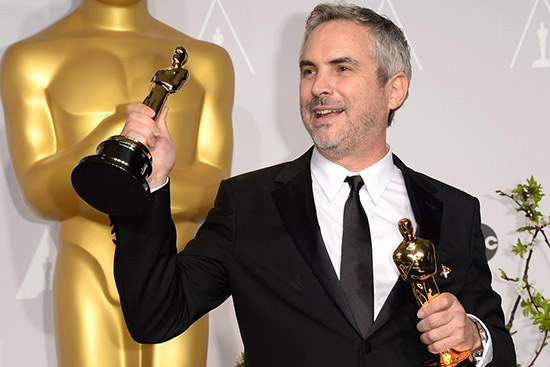這家公司正努力成為拿奧斯卡獎專業戶
|
2018年的圣丹斯電影節上,塔瑪拉·詹金斯的電影《私人生活》第一次放映,她也經歷了拍電影27年來從未有過的感受。 “我聽到身后有人在笑,他們喜歡這部電影。”詹金斯說道。這部片子由Netflix出資,她負責編劇并執導,講述了一對紐約夫婦因不孕不育而苦苦掙扎的故事。“我轉身看到了泰德·薩蘭多斯。他像真正的電影愛好者一樣。看到高管如此用心地看電影,我其實很吃驚。” Netflix的首席內容官薩蘭多斯非常喜歡《私人生活》,他將這部電影添加到奧斯卡頒獎季推薦的十幾部電影片單。成立20年后,有望贏得Netflix獎項的影片將首次在影院上映,在網絡正式播放前獲得前所未有的預熱。片子包括:《私人生活》、保羅·格林格拉斯的《挪威7·22爆炸槍擊案》、安迪·瑟金斯的《森林之子毛克利》、科恩兄弟的《巴斯特·斯克魯格斯的歌謠》、桑德拉·布洛克主演的《蒙上你的眼》,以及導演阿方索·卡隆的西班牙語電影《羅馬》。Netflix的推薦影片中最有望角逐奧斯卡的是卡隆作品,將于12月14日正式上線,屆時多達20個國家的1.3億用戶均可觀看。 |
When her movie Private Life screened for the first time at the 2018 Sundance Film Festival, Tamara Jenkins says she experienced something she never had in her 27 years as a filmmaker. “I heard someone behind me laughing, loving the movie,” says Jenkins, who wrote and directed the Netflix-financed film about a New York couple struggling with infertility. “I turn around and it’s Ted Sarandos. He was reacting to it like a film lover. It was startling to see an executive have a visceral reaction like that.” Sarandos, Netflix’s chief content officer, loved Private Life so much that he added the movie to the streaming giant’s slate of nearly a dozen films it’s pushing during this long Oscar awards season. For the first time in its 20-year history, Netflix’s awards hopefuls are showing in theaters en masse, receiving unprecedented runs ahead of their stream dates. Among them: Private Life, Paul Greengrass’s 22 July, Andy Serkis’s Mowgli, the Coen Brothers’ The Ballad of Buster Scruggs, the Sandra Bullock–starring Bird Box, and director Alfonso Cuarón’s Spanish language Roma. The Cuarón film, Netflix’s Oscar-contender crown jewel, may appear in up to 20 countries theatrically by the time its 130-million-plus subscribers can stream it on Dec. 14. |

|
影片上線之間就大規模推介,其實并不符合薩蘭多斯一直以來的原則。這次開創了新歷史,一位業內人士表示,此舉讓諸多想為影迷放映Netflix影片的電影院老板很難過。這也為視頻競爭對手打開了一扇新大門,以后頒獎季各家均可想辦法推介影片。2016年,亞馬遜推出的電影《海邊曼徹斯特》就先在影院上映三個月之后才上網,后來獲得奧斯卡最佳影片和最佳導演提名,最終捧回最佳原創劇本和最佳男演員獎項。 “Netflix現在更重視贏得奧斯卡獎,可以為公司帶來品牌效應。”資深電影記者安妮·湯普森表示,她擔任業內刊物《IndieWire》的自由編輯。她表示,去年夏天薩蘭多斯聘請好萊塢最受歡迎的奧斯卡推廣戰略家麗莎·塔巴克(曾負責推廣《愛樂之城》和《月光男孩》等)加入公司,就能看出Netflix在下大力氣瞄準奧斯卡小金人。另一位匿名的接近好萊塢人士表示,由于Netflix積極搭建商業關系,現在每年花在爭取獎項方面的預算可能高達2000萬美元。“泰德用以前在電視圈的手段打通電影圈,”湯普森說。“好萊塢都有點害怕了。” 可能由于害怕,也可能出于戰略性考慮,《財富》雜志詢問好萊塢高管、推廣戰略家、代理商、學院評委和制片人怎么看Netflix努力爭取獎項時,極少有人愿意發表評論。( “大家都不愿亮出底牌,特別是今年。”一位顧問表示。)薩蘭多斯和塔巴克也拒絕就本文發表評論,但Netflix的發言人證實了奧斯卡頒獎季的推廣策略細節。 Netflix在奧斯卡頒獎典禮上的運氣時好時壞。2015年,該公司認為《無境之獸》有望榮獲最佳影片獎,但沒怎么向評委推薦,影院票房表現也不佳。Netflix憑借2016年的《發生什么了,西蒙妮小姐?》和2017年艾娃·德約列的《第十三修正案》連續獲得最佳紀錄片提名。今年1月,備受好評的《泥土之界》獲得了四項重要提名,但未獲最佳影片提名。 薩蘭多斯今年的希望都寄在《羅馬》一片身上,這部影片是庫隆寫給幼時保姆的一封情書,當時他生活在墨西哥城羅馬社區。這也是Netflix歷年推介影片里最有希望奪得最佳影片獎的一部。片子里沒有著名演員(主演雅利扎·阿巴里西奧是墨西哥瓦哈卡州的幼兒園老師),全片采用黑白攝影,混合西班牙語和本地方言。一位學院獎成員表示,《羅馬》很有可能獲得“不太主流”的奧斯卡獎項,比如最佳攝影和最佳音效剪輯,在最容易吸引評委的演員層面可能不太容易突破,因為表演太原生態了。庫隆拍攝《羅馬》時采用了昂貴的65毫米格式,還用上了杜比全景聲錄音技術,吸引的觀眾顯然會比《復仇者聯盟》更學院派。 據一位高管稱,Netflix發布《羅馬》時可能采取“四面墻”策略,由制片公司出租影院,以免電影受到票房表現的影響。另一位內部人士指出,Netflix可以“輕松”成為業內最大的獎項廣告主。“各種策略都在發揮作用,因為早期學院評委抵觸‘電視公司’制作奧斯卡電影的精英主義優越感已然消失。”李奇·利卡塔表示,他是Licata&Co.的資深戰略家兼首席執行官。“以前的問題是評委年紀太大,理解不了Netflix。但現在氛圍比較正面。獎項行業也有必要創新了。所以Netflix和亞馬遜都在努力。巨頭們吸引人才,而人才掌控好萊塢。” 今年秋天,詹金斯的《私人生活》一片榮獲了哥譚獨立電影獎最佳編劇和最佳女主角提名(該獎項通常是奧斯卡的預熱)。這樣一部由角色推動的、Netflix出品的電影能在美國、英國和加拿大的大屏幕上放映,還可以被選送參加奧斯卡評獎,實在讓人興奮。“我以為最多能在一兩家電影院上映,”她說,“根本無法想象能走進21家電影院。感覺像是正式的發行排片。不管在電影世界還是真實世界,這都是最棒的消息。”(財富中文網) 本文另一版本發表于2018年12月1日出版的《財富》雜志,標題為《Netflix的奧斯卡工廠》。 譯者:Pessy 審校:夏林 |
Such a massive rollout bucks Sarandos’s long-standing rule against releasing movies in theaters ahead of their stream dates. It’s a history that one insider says has frustrated theater owners who have been eager to show Netflix films for their cinephile-leaning audiences. It has also opened the door for streaming competitors to establish their own awards-season presence at the multiplex: Amazon’s 2016 film Manchester by the Sea had a three-month theatrical run before it streamed online and went on to earn Best Picture and Best Director nominations and statues for Original Screenplay and Lead Actor. “Netflix is now prioritizing winning Oscars as a branding benefit for the company,” says Anne Thompson, a veteran film reporter who serves as editor-at-large for the trade publication IndieWire. She says Netflix’s doubling-down on awards was cemented when Sarandos hired Hollywood’s most in-demand Oscar-campaign strategist, Lisa Taback (La La Land, Moonlight), last summer to work in-house for Netflix. Another Hollywood insider, who declined to be named citing active business relationships, estimates the company’s annual awards budget could now be as high as $20 million. “Ted is doing for movies what he’s done for TV,” says Thompson. “And Hollywood is running scared.” Whether scared or strategic, precious few of the Hollywood executives, campaign strategists, agents, Academy voters, and producers that Fortune asked about Netflix’s awards efforts were willing to speak on the record. (“No one wants to show their hand, especially this year,” one consultant says.) ?Sarandos and Taback also declined to comment for this article, but a Netflix spokesperson did confirm details of the company’s Oscar-season rollout strategy. Netflix’s luck at the Academy Awards has ebbed and flowed. In 2015, the company positioned Beasts of No Nation as a Best Picture hopeful, but the film failed to connect with voters and performed poorly in theaters. Netflix earned consecutive Best Documentary nominations in 2016 for What Happened, Miss Simone? and in 2017 for Ava DuVernay’s 13th; in January, the critically acclaimed Mudbound earned four major nominations but failed to break into the Best Picture pool. Sarandos’s hopes this year are pinned on Roma, Cuarón’s love letter to the nanny who helped raise him in Mexico City’s Roma neighborhood in the 1970s. It also may be one of the biggest Best Picture gambles of all time. It features no known actors (lead Yalitza Aparicio is a preschool teacher from Oaxaca), it’s filmed in black and white, and it’s in a mix of Spanish and indigenous languages. One Academy member says Roma risks being favored more by voters in “below the line” Oscar categories like cinematography and sound design and may not connect as easily with the Academy’s largest contingent of voters—actors—because the performances are so natural. Cuarón shot Roma in the expansive 65-millimeter format using Dolby Atmos sound technology, all making it likely to attract an audience that’s more art house than Avengers. Netflix, according to one executive, therefore will likely employ a “four wall” release strategy for Roma, a tactic in which studios essentially rent out theaters to make films immune to poor box-office performance. Another insider notes that Netflix is “easily” the business’s largest awards advertiser. “It’s all working, because that early sense of elitism among film Academy voters about a ‘TV company’ making Oscar movies is gone,” says Rich Licata, a veteran awards strategist and CEO of Licata & Co. “There was a fallacy of voters being too old to understand Netflix. But the sentiment is positive now. There’s been a need to innovate the awards business. That’s what Netflix and Amazon are both doing. They’re attracting talent, and talent runs Hollywood.” For Jenkins, whose film Private Life earned nominations for Best Screenplay and Lead Actress from the Gotham Independent Film Awards this fall (often a harbinger of Oscar’s favorites), the idea that a character-driven Netflix movie like hers would land on the big screen across the U.S., in the U.K., and in Canada—let alone be in the mix for Oscars—is still sinking in. “I thought we’d be in one or two theaters total,” she says. “I could have never imagined 21. It actually felt like a real release. It’s been the best of both worlds.” A version of this article appears in the December 1, 2018 issue of Fortune with the headline “Netflix’s Oscar Factory.” |













